Moshi, TZ – Tupendane improving profits for small scale farmers – 5 Jun 2015

Market access is a challenge for small-scale farmers across the world, from America to Tanzania. Most small-scale farmers need to move a relatively small and diverse harvest from rural areas to population centers and then distribute the produce throughout those population centers. Marketing is difficult for farmers living far away and the middlemen and transportation costs involved consume the profit the farmers need to survive.
Over the past two years Tupendane has helped start over 120 gardens for families and schools in Kahe Ward. As part of its effort to improve the lives of families in Kahe, Tupendane is developing a marketing and distribution process that they hope will enable small scale farmers and gardeners to profit from their efforts.
Tupendane began marketing by selling produce from their pilot farm. They took their products to restaurants to gain an understanding of restaurants’ expectations of design, budget, and schedule for vegetable deliveries. The objective is to help families begin supplying restaurants. As Tupendane continues adding customers, the market will increase for other small farmers in Kahe.
The pilot farm can enable Tupendane to continue expanding their customer base by keeping supply ahead of demand. When a new customer joins the program, the pilot farm ensures there are enough vegetables to supply them until more small growers improve production.
Marketing is only one piece of the challenge facing small rural growers. The bigger challenge is distribution. Tupendane aims to improve this as well. The team is developing a system to deliver fresh, quality vegetables from rural areas to population centers at low cost.
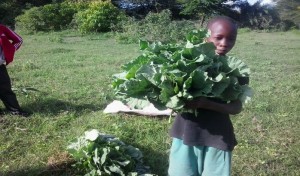
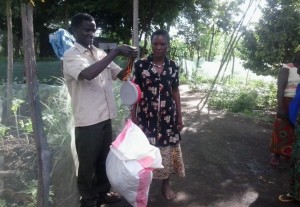 Before distribution, Tupendane must work with families to set quality expectations. Quality is comprised of design, budget, and schedule. The team must teach families how to identify market-quality vegetables (design) and they must weigh vegetables with the family so the family learns to estimate the value of their harvest (budget). The team must also teach families how to harvest sustainably so they can get consistent harvests each week (schedule). Many families are tempted to harvest everything at one time and get a big short-term profit, but this reduces the total harvest they are able to get throughout the year. Sustainable harvesting delivers consistent profits all year and a higher annual profit.
Before distribution, Tupendane must work with families to set quality expectations. Quality is comprised of design, budget, and schedule. The team must teach families how to identify market-quality vegetables (design) and they must weigh vegetables with the family so the family learns to estimate the value of their harvest (budget). The team must also teach families how to harvest sustainably so they can get consistent harvests each week (schedule). Many families are tempted to harvest everything at one time and get a big short-term profit, but this reduces the total harvest they are able to get throughout the year. Sustainable harvesting delivers consistent profits all year and a higher annual profit.
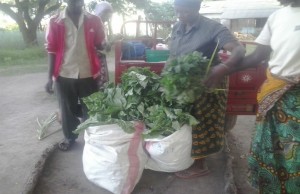
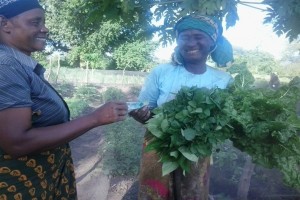 Once families understand quality expectations they begin delivering their harvests to collection points throughout Kahe ward. Tupendane is developing collection points at primary schools to make the collection process easy. Children can bring harvests to school with them in the morning on collection days. Growers are paid immediately upon collection.
Once families understand quality expectations they begin delivering their harvests to collection points throughout Kahe ward. Tupendane is developing collection points at primary schools to make the collection process easy. Children can bring harvests to school with them in the morning on collection days. Growers are paid immediately upon collection.
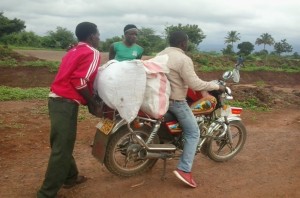 Once vegetables have been collected they are packed and stored in a cool dry place to keep them fresh for delivery the following day.
Once vegetables have been collected they are packed and stored in a cool dry place to keep them fresh for delivery the following day.
“Storing the vegetables overnight sacrifices a little freshness [design] but helps us make sure we always make deliveries on time [schedule], and this creates the most value for our customers,” explains Tupendane manager Deogratius Matemu.
Deliveries are loaded early in the morning. To reduce transport costs Tupendane works with motorcycle drivers who work in Moshi. Because the drivers drive to Moshi everyday for work, they are happy to take vegetables for a smaller fee than hiring a private truck.
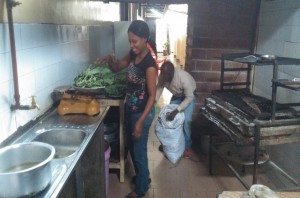 The delivery man brings the vegetables to the restaurants, where kitchen staff sorts the vegetables to remove poor quality produce. All of the accepted produce is weighed again and the restaurant agrees to pay for the accepted produce. No cash is exchanged at the time of delivery. The delivery man and the restaurant representative sign a ledger recording the total weight of vegetables accepted and at the end of the month the restaurants pay Tupendane directly.
The delivery man brings the vegetables to the restaurants, where kitchen staff sorts the vegetables to remove poor quality produce. All of the accepted produce is weighed again and the restaurant agrees to pay for the accepted produce. No cash is exchanged at the time of delivery. The delivery man and the restaurant representative sign a ledger recording the total weight of vegetables accepted and at the end of the month the restaurants pay Tupendane directly.
After the first delivery the delivery man continues to other restaurants until all of the vegetables have been delivered.
Tupendane is excited about the process they have put in place so far. However, there is still work to be done improving the system and ensuring that everyone in the value chain has the same definition of quality. Some of the challenges Tupendane must solve to build a sustainable process include pricing, quality control, and continuous market growth.

